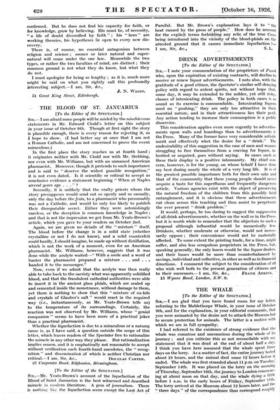DRINK ADVERTISEMENTS
[To the Editor of the SPECTATOR.] note your commendation of the proprietors of Punch who, upon the expiration of existing contracts, will decline to receive or renew liquor advertisements. I note also, with the gratitude of a good citizen, the Spectator's similar self-denying policy with regard to ardent spirits, not without hope that, some day, it may be extended to the milder, yet still risky, classes of intoxicating drink. The policy in both cases is as sound as its exercise is commendable. Intoxicating liquors need no " pushing," they are only too attractive in their essential nature, and in their attractiveness lies their peril. Any action tending to increase their consumption is a public disservice.
This consideration applies even more cogently to advertise. ments upon walls and hoardings than to advertisements ir. the Press. Many of the former have very considerable artistic merit and effectively whet the desire for a " drink." The undesirability of this suggestion in the case of men and women struggling to free themselves from a craving for liquor, in- herited or acquired, goes without saying. In cases such as these their display is a positive inhumanity. My chief con- cern, however, is for the young, on whose behalf I have done my best during nearly the whole of a very long life. It is of the greatest possible importance both for their own sake and that of the community that these young people should never acquire a taste for this superfluous and frequently dangerous article. Various agencies exist with the object of preserving the natural freedom of the children from this possibly fatal entanglement, and it is obvious that these advertisements cut clean across this teaching and thus assist to perpetuate the ever present drink problem."
It would, perhaps, be too daring to suggest the suppression of all drink advertisements, whether on the wall or in the Press, but it is worth while to remember that the objectors to such a proposal although influential would be numerically few. Drinkers, whether moderate or otherwise, would not necess- sarily oppose ; their convenience would not be materially affected. To some extent the printing trade, for a time, might suffer, and also less scrupulous proprietors in the Press, but, speaking generally, the only losers would be the liquor dealers, and their losses would be more than counterbalanced by savings, individual and collective, in other as well as in financial directions. I commend the subject to the consideration of all who wish well both to the present generation of citizens and
to their successors.--I am, Sir, &C., FRANK ADKINS. 15 Wynne Road,' London, S.W. 9.






















































 Previous page
Previous page